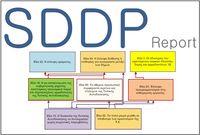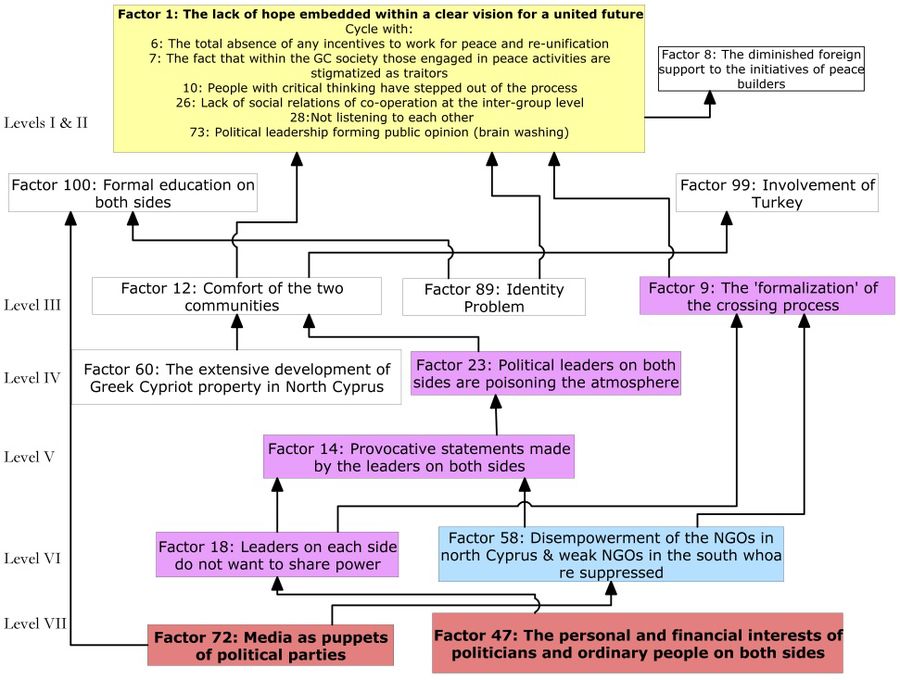SDDP Civil Society Dialogue Obstacles: Difference between revisions
No edit summary |
|||
| Line 19: | Line 19: | ||
The Troodos co-Laboratory was the last of the 10 and took place at the [[Forest Park]] (Platres, Troodos) between 16-17 February, 2010. Twenty four representatives of regional local authorities participated in the dialogue. Participants included both elected officials and employees of near-by local authorities.<br> | The Troodos co-Laboratory was the last of the 10 and took place at the [[Forest Park]] (Platres, Troodos) between 16-17 February, 2010. Twenty four representatives of regional local authorities participated in the dialogue. Participants included both elected officials and employees of near-by local authorities.<br> | ||
The [[Knowledge Management Team]] included Mr. [[Savvas Savva]], President of the Local Authorities Union of Limassol and Mr. [[Marios Michaelides]], Vice-President of the [[Cyprus Academy of Public Administration]], in addition to [[SDD Facilitator |SDD Facilitators]] [[Aleco Christakis]], [[Yiannis Laouris]] and [[Georgina Siitta Achilleos]].<br><br> | The [[Knowledge Management Team]] included Mr. [[Savvas Savva]], President of the Local Authorities Union of Limassol and Mr. [[Marios Michaelides]], Vice-President of the [[Cyprus Academy of Public Administration]], in addition to [[SDD Facilitator |SDD Facilitators]] [[Aleco Christakis]], [[Yiannis Laouris]] and [[Georgina Siitta Achilleos]].<br><br> | ||
<u>The same [[Triggering Question]] (TQ) was used for | <u>The same [[Triggering Question]] (TQ) was used for most SDDPs:</u> | ||
* '''What influences the efficient operation of local authorities?''' | * '''What influences the efficient operation of local authorities?''' | ||
Revision as of 09:30, 22 July 2011
|
Executive Summary
The Troodos Co-Laboratory was part of 10 Structured Dialogic Design (SDDP: Structured Dialogic Design Process) Co_laboratories, which took place between December 2009 and February 2010 all over Cyprus and were implemented by Future Worlds Center.
The Troodos co-Laboratory was the last of the 10 and took place at the Forest Park (Platres, Troodos) between 16-17 February, 2010. Twenty four representatives of regional local authorities participated in the dialogue. Participants included both elected officials and employees of near-by local authorities.
The Knowledge Management Team included Mr. Savvas Savva, President of the Local Authorities Union of Limassol and Mr. Marios Michaelides, Vice-President of the Cyprus Academy of Public Administration, in addition to SDD Facilitators Aleco Christakis, Yiannis Laouris and Georgina Siitta Achilleos.
The same Triggering Question (TQ) was used for most SDDPs:
- What influences the efficient operation of local authorities?
In response to the TQ, the 24 participants came up with 66 obstacles, which were categorized in 10 clusters. Following the voting process, 37 ideas received one or more votes, but only 23 ideas, that received 2 or more votes, were structured to create the influence MAP shown below.
According to the participants of the Troodos Co_Laboratotory, the obstacles with the greatest negative influence on the efficiency of local governance in Cyprus were:
- Idea #1, The long delays on the side of the government in taking decisions and
- Idea # 65, The fact that local authorities are not organized in larger complexes
The Co-Laboratory was facilitated by Aleco Christakis, Georgina Siitta Achilleos and Elena Aristodemou, with support from Yiannis Laouris and Marios Michaelides. The Co-Laboratory was also attended by Dimitris Diamantis Senior Manager at Information Technology Management Consultants (ITMC)[1], who is in charge of the Management Module of the overall project. In sum, the participants of the dialogue reported their satisfaction that their voices have been heard and documented and communicated their expectations for follow-up activities to address the diagnosis of their needs.
The full report can be downloaded from here
Sponsor and partners
The initiative which eventually led to the birth of the Civil Society Dialogue project was inspired by a team of six veteran peace pioneers, who decided to meet (physically) in September 2006 to discuss the post-referendum political situation in Cyprus and explore possibilities to revive their dream for a reunited island. These six pioneers were members of the peace group, widely known as Cyprus Conflict Resolution Trainers Group (CRTG), which in the years between 1994 and 1997 managed to inspire and mobilize a few thousand Cypriots to work for peace and reconciliation.
External Links
- Download the full report here
- Visit the project's website here
- Visit Cyprus Academy of Public Administration website

